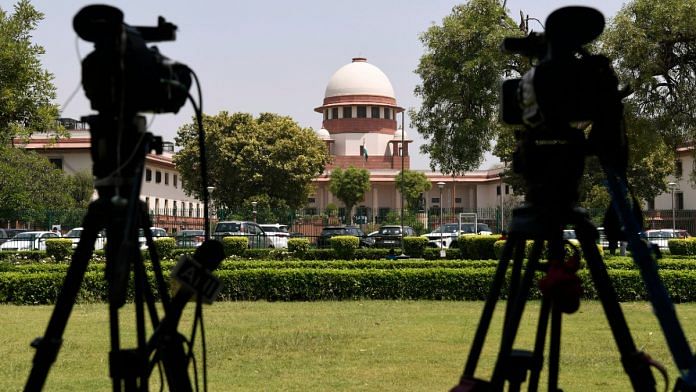New Delhi: The Bar Council of India (BCI) and all the State Bar Councils Sunday passed a joint resolution against the ongoing hearing on a batch of petitions in the Supreme Court, demanding legal recognition of same-sex marriage, claiming the proceedings “is a matter of great anxiety and serious concern for the bar.”
The resolution urges the top court to leave the issue “for legislative consideration,” who after a wide-ranging consultative process, many arrive at an appropriate decision, “as per the societal conscience and mandate of the people of our country.”
The Modi government has put forth a similar argument, while raising a preliminary objection to the petitions. It had asked the court to let elected representatives debate on the issue in Parliament, after seeking inputs from stakeholders.
In the same breath, however, the resolution “appreciates the step of the honourable Supreme Court” for having started the “sensitive conversion,” having “long-term societal ramifications.”
Yet, the resolution believes that since more than 99.9 per cent of people of the country are opposed to the idea of same-sex marriage and that “India is one of the most socio-religiously diverse countries of the world consisting of a mosaic of beliefs,” therefore, the court should deal issues pertaining to social and religious connotations through “doctrine of deference.”
“The legislature being truly reflective of the will of the people is best suited to deal with such sensitive issues. Every responsible and prudent citizen of the country is worried about the future of his/her children after coming to know about the pendency of this matter before the Honourable Supreme Court,” it reads.
BCI, the apex disciplinary body for the legal profession, is also the regulator of legal education in India. The Council derives its power from the Advocates Act, 1961, the law relating to legal practitioners in the country and also provides for the constitution of state bar councils and BCI.
The Sunday meeting was presided over by senior advocate Manan Kumar Mishra, who is the Chairman of BCI. Though the meeting also discussed and passed resolution regarding approval of recent BCI rules for registration and regulation of foreign lawyers and law firms, strikes by lawyers and qualification for being a voter in the elections of state bar councils, the resolution released Sunday evening predominantly spoke of the same-sex marriage case.
The joint resolution claimed that the Bar is the “mouthpiece of the common men” and, therefore, it has expressed its anxiety over “the highly sensitive issue” through the resolution.
“The vast majority believes that any decision of the Apex Court in petitioners’ favour on this issue will be treated to be against the culture and socio religious structure of our country. The Joint Meeting is of clear opinion that if the Hon’ble Supreme Court shows any indulgence in this matter, it will result in destabilizing the social structure of our country in coming days,” the Council notes, adding that it expected the top court “to appreciate and respect the sentiments and mandate of the mass of the country.”
Makes case for traditional values
Stating that the petitions have challenged the “traditional and old aged marriage laws” on the grounds of being unconstitutional, the resolution bats for Parliamentary intervention in a matter that has “far-reaching impact on our socio-cultural and religious beliefs should necessarily come through legislative process only.”
Since the responsibility of lawmaking has been entrusted to the legislature under the Constitution, the laws made by the legislature are truly democratic as they are made after undergoing thorough consultative processes and reflect the views of all sections of the society, adds the resolution.
Any decision by the court in such a sensitive matter may prove very harmful for the future generation, therefore, the joint meeting took a “unanimous opinion” that the issue be dealt with “after an elaborative consultation process involving different social, religious groups by the competent legislature.”
The resolution speaks of documented history to assert that “marriage has been typically accepted and categorised as a union of biological man and woman for the twin purpose of procreation and recreation.”
Therefore, it would be catastrophic to overhaul something as fundamental as the conception of marriage by any court, however well-intentioned it may be, the resolution added.
“Law is essentially a codified societal norm that reflects the collective conscience of its people. Moreover, religion being intertwined with culture, greatly influences the codification of law and societal norms in any civilized society,” it said.
(Edited by Tony Rai)
Also Read: Neither ‘urban’ nor ‘elitist’ — what data shows about Indians’ views on same-sex relationships



